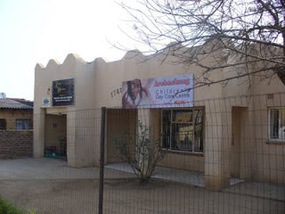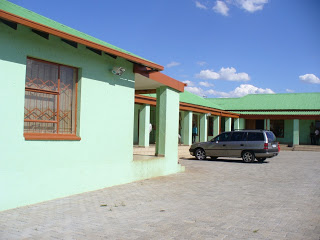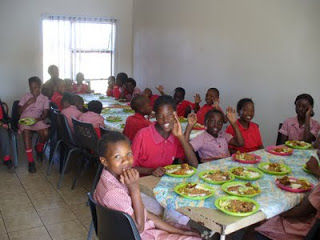 The Arebaokeng community project has a crèche (daycare/pre-school) and an after-school program for children who have lost parents to HIV/AIDS. When I lived in South Africa, the children were cared for in an old house. The dining room/classroom was a garage. On cold days the little ones crowded into a tiny bedroom with no furniture. When it rained, the center had to close because the roof leaked so badly there were puddles all over the floor. Arebaokeng has the sponsorship of Spar, a prominent South African supermarket chain. They have just moved into a new facility with three classrooms, dining hall, kitchen, office space, a wide veranda and playground equipment. There is even a promise of computers to come. And best of all—the roof doesn’t leak! It was a delight to return and greet old friends. I read Jane and Chris Kurtz’s Water Hole Waiting to the little ones. They loved identifying the different animals, and Mama Monkey’s repeated, “Wait!”
With the older ones I read The King’s Fountain by Lloyd Alexander. It is the story of a poor man concerned that the king is planning to build a fountain that will divert water from the city so the people and animals will be thirsty. He asks the scholar to go and explain to the king the damage that will be done, but the scholar is so caught up in his lofty ideas that he can’t get involved with the practical. The poor man goes to the merchants who know how to speak cleverly, but they are too afraid of the king. He goes to the strong man, but the strong man is all action without thinking through the consequences. At last his little daughter convinces the poor man to go himself. In the end his simple honesty convinces the king not to build the fountain. Some of Alexander’s language is a little hard for these township children whose English is anything but fluent despite their schooling in English. They weren’t sure what a fountain was. There was no picture in the book since the fountain was never built. Their teacher Liza and I had to come up with a place in the city where there was one they had seen. The lesson I wanted them to get was that even an ordinary person like them can make a difference if he has the courage to speak up and tell the truth. “Perhaps someone will say to you, ‘Those people are from Mozambique or from Zimbabwe,’” I explained. “’Let’s go and hurt them. They aren’t like us.’” (Unfortunately the xenophobia that erupted last year is at the point of exploding again due to the pressures of unemployment.) I continued, “If you are like the poor man in the story, you will speak the truth. ‘They are like us inside. It isn’t right to hurt them.’ Even though you aren’t big and important, you can make a difference.” The children wanted to know where I have been for so long. They have no concept of how far America is. “I’ll be back next week,” I said. Liza suggested that they write letters for me to take to America. I told them to include a return address if they would like an answer. Contact me if you would like to respond to one of these eager children.
0 Comments
Leave a Reply. |
AuthorLeAnne Hardy has lived in six countries on four continents. Her books come out of her cross-cultural experiences and her passion to use story to convey spiritual truths in a form that will permeate lives. Add http://www.leannehardy.net/1/feed to your RSS feed.
To receive an e-mail when I post a new blog, please subscribe.
Categories
All
Archives
November 2022
|


 RSS Feed
RSS Feed